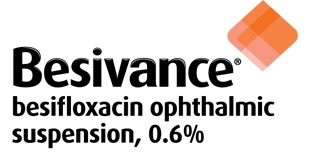Is this e-mail not displaying correctly? View this e-mail in your browser. |
|
| Interested in FREE samples of BESIVANCE®? | |
 |
|
IndicationBESIVANCE® is a quinolone antimicrobial indicated for the treatment of bacterial conjunctivitis caused by susceptible isolates of the following bacteria: Aerococcus viridans,* CDC coryneform group G, Corynebacterium pseudodiphtheriticum,* Corynebacterium striatum,* Haemophilus influenzae, Moraxella catarrhalis,* Moraxella lacunata,* Pseudomonas aeruginosa,* Staphylococcus aureus, Staphylococcus epidermidis, Staphylococcus hominis,* Staphylococcus lugdunensis,* Staphylococcus warneri,* Streptococcus mitis group, Streptococcus oralis, Streptococcus pneumoniae, Streptococcus salivarius* |
|
| *Efficacy for this organism was studied in fewer than 10 infections. | |
|
|
Important Risk Information about BESIVANCE®
|
|
You are encouraged to report negative side effects of prescription drugs to the FDA. |
|
Please see complete information about BESIVANCE® in the full prescribing |
|
| References: 1. BESIVANCE Prescribing Information, September 2012. 2. Tepedino ME, Heller WH, Usner DW, et al. Phase III efficacy and safety study of besifloxacin ophthalmic suspension 0.6% in the treatment of bacterial conjunctivitis. Curr Med Res Opin. 2009;25(5):1159-1169. 3. Data on file, Bausch & Lomb Incorporated. 4. Proksch JW, Granvil CP, Siou-Mermet R, Comstock TL, Paterno MR, Ward KW. Ocular pharmacokinetics of besifloxacin following topical administration to rabbits, monkeys, and humans. J Ocul Pharmacol Ther. 2009;25(4):335-343. 5. Haas W, Gearinger LS, Usner DW, DeCory HH, Morris TW. Integrated analysis of three bacterial conjunctivitis trials of besifloxacin ophthalmic suspension, 0.6%: etiology of bacterial conjunctivitis and antibacterial susceptibility profile. Clin Ophthalmol. 2011;5:1369-1379. | |
For product-related questions and concerns, call 1-800-323-0000 or visit www.besivance.com. |
|
If you no longer wish to receive e-mails from Bausch + Lomb about BESIVANCE®, unsubscribe here. |
|
 |
 |
BESIVANCE is a registered trademark of Bausch & Lomb Incorporated. ©2012 Bausch & Lomb Incorporated. PH4687 9/12 |
|
